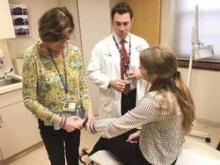At the Rheumatic Skin Disease Clinic in Manhasset, N.Y., dermatologist Dr. Amit Garg regularly discusses patient cases and develops care plans alongside rheumatologists after each specialist separately visits the same patient. The dual dermatology-rheumatology clinic has led to countless benefits, including improved quality of care for patients and multi-discipline training for new and veteran physicians, said Dr. Garg, clinic codirector and chair of the dermatology department at North Shore–Long Island Jewish Health System in New York.
Perhaps the greatest advantage of the combined clinic, however, is the research inspiration generated by the collaboration. “Working closely with colleagues in another discipline makes the environment really ripe for new ideas based on observations we may see in the patients we’re treating,” Dr. Garg said in an interview. “It’s amazing how when you’re thinking through a patient’s care together, how quickly you appreciate where the gaps are in our understanding of disease and evaluation and management of disease. From there, you take it to the next step of planning research projects or protocols to essentially fill those gaps in knowledge.”
Dr. Garg’s clinic is one of a growing number at U.S. academic medical centers that combine dermatologic and rheumatologic care for the management of psoriatic arthritis (PsA) and other interrelated skin and musculoskeletal diseases. Clinic operations vary from virtual consults, to simultaneous assessments, to sequential patient visits, but all focus on collaborative care and disease management. The institutions using such models recently united to form the Psoriasis and Psoriatic Arthritis Clinics Multicenter Advancement Network, a national organization that develops research initiatives and assists other centers in creating similar programs. At least 10 institutions are now participating in the network, including NYU Langone Medical Center, New York; Harvard University’s Brigham and Women’s Hospital, Boston; and the National Psoriasis Foundation, Portland, Ore.
Combining dermatology and rheumatology care through a dual clinic follows an ongoing trend by academic medical centers to integrate specialties that treat overlapping conditions, said Dr. Alexis R. Ogdie-Beatty, a rheumatologist at the University of Pennsylvania Health System in Philadelphia and director of the Penn Psoriatic Arthritis Program.
“It was kind of a natural thing for rheumatic disease because our diseases are multisystem in nature in most cases,” Dr. Ogdie-Beatty said in an interview. “I think the increasing knowledge of the need for communication [between specialists] drove this.”
Dr. Ogdie-Beatty leads a virtual rheumatology-dermatology clinic at the University of Pennsylvania where she meets weekly with two dermatologists to discuss research studies, shared patients, and case management. The physicians primarily see patients separately, but occasionally will visit patients at the same time, she said. In addition, dermatologists on the team immediately contact Dr. Ogdie-Beatty if they are seeing a patient who might benefit from an assessment by the rheumatologist and vice versa, she said.
“One of our favorite parts is learning from each other,” Dr. Ogdie-Beatty said in an interview. “I’ve learned a lot about skin disease and psoriasis, and they’ve learned about inflammatory arthritis and management. The ultimate impact for the patient is to have more well rounded care so that both the skin disease and the arthritis are being taken care of in a comprehensive way.”
Dermatology and rheumatology medical students and residents exposed to such clinics have the unique opportunity to learn about disease overlap and strengthen their understanding of the other’s specialty, added Dr. Joseph F. Merola, codirector of the Center for Skin and Related Musculoskeletal Diseases, a combined clinic at Brigham and Women’s Hospital in Boston. Dr. Merola’s center also has created a fellowship program in which either a dermatologist or rheumatologist can spend 1 year training at the clinic.
Research opportunities abound at the combined clinics, physicians said. At the Center for Skin and Related Musculoskeletal Diseases for example, physicians have developed new outcome metrics for measuring psoriasis and screening for PsA, Dr. Merola said. Physicians also commonly refer clinic patients for clinical trials, he said.
“It’s a great place for patients who have been through many other therapies,” said Dr. Merola, who practices dermatology and rheumatology. “If they are at the end of the line, we have a number of clinical trials that we can offer them. Because it tends to be a referral center, these are patients who have more complex disease, so being able to offer them clinical trials and multiple opinions has been really key.”




